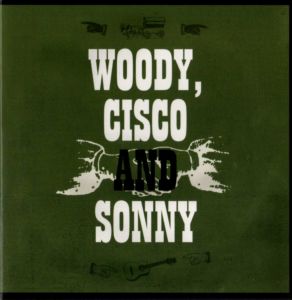
- Format: FLAC

It's nearly impossible to fathom that recordings so alive and important sat untouched in a Brooklyn basement for six decades, but that's how the story of My Dusty Road begins. Long story short: an elderly woman had inherited a cache of some 2,000 metal disc recordings cut in the 1940s for Herbert Harris, owner of the Stinson Records label, and Moses Asch, who went on to found Folkways Records. Among them, most in pristine condition (some were scratched but the metal masters were otherwise shiny and new-looking), were roughly 150 sides made in April 1944 by one Woodrow Wilson Guthrie, first-class performances from his peak years. It should be noted up front that this is not a discovery of music that hasn't seen the light of day before -- only six of the 54 tracks that ended up on the four-CD box set are previously unreleased; the rest have been issued by Stinson (and on various reissues). My Dusty Road can, however, be considered a significant sonic upgrade. Some of the metal discs were damaged, but enough was salvageable -- and able to be cleaned up with modern technology -- that this collection (including six alternate versions Guthrie never released elsewhere) culled from that basement can now be considered a worthy new piece of the Guthrie canon. Divided into four thematic segments -- Woody's "Greatest" Hits, Woody's Roots, Woody the Agitator, and Woody, Cisco and Sonny (i.e., Guthrie and fellow folksingers Cisco Houston and Sonny Terry) -- the set is both familiar and fresh-sounding at once.
Opening with "This Land Is Your Land," it becomes immediately noticeable throughout the first disc that, although there is still a certain amount of hiss and scratch present (these recordings did, after all, sit in a basement for 60 years), Guthrie's voice and guitar are brighter, more immediate. Two versions of "Going Down the Road," one a collaborative effort with Houston and Terry, the other with only Houston, are lively and poignant, and other staples such as "The Sinking of the Reuben James" and "Pretty Boy Floyd" feel more like intimate coffeehouse recordings than, as they did before, distant and flat. "Bad Repetation" (sic), the first of the never-heard songs, ends disc one, a clever, uptempo indictment of a male suitor's paying the price for his misbehavior. Of the songs on disc two, again many have become standards of the Guthrie and general folk song repertoire, interpreted by countless artists over the years: "Stewball," "Worried Man Blues," "John Henry," etc. Here they come alive as if a layer of grime has been wiped off the surface. Similarly, the topical songs that populate disc three and the collaborations on the final disc, while not altering the actual Guthrie story in any major way, do allow listeners to move in a little closer and experience the music as it was performed during those 1944 days. "Guitar Rag," a previously unreleased instrumental featuring Guthrie and Houston on guitars and Terry on harmonica, is truly thrilling, a pure sampling of what it would have been like to watch these three greats sitting around jamming casually. And "Sonny's Flight," which closes out the package and has also never before been issued, is a terrific stomping folk-blues that places Terry's harmonica front and center. My Dusty Road is a significant find, even if it doesn't rewrite the Woody Guthrie tale.